Vladimir Putin ups the nuclear ante against the West
Russia says it may be forced to aim weapons at Washington and cut strike time
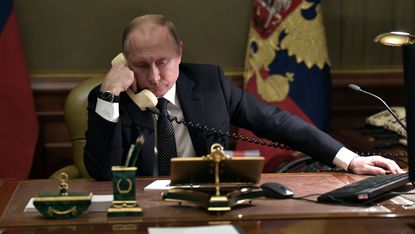
Vladimir Putin has threatened to develop new long-range weapons to target Western capitals and cut nuclear strike times, in what has been interpreted as a serious but deliberate escalation in arms race rhetoric.
In a major speech on the state of the nation, the Russian president warned that if the West deployed new short and medium-range missiles in Europe that had the potential to reach Moscow in less than ten minutes, Russian missiles would be re-directed towards Western “centres of decision-making”.
The Guardian says “the threat, which appears to describe Washington and other western capitals, came after the United States and then Russia suspended compliance with the 1987 Intermediate-Range Nuclear Forces treaty”.
Subscribe to The Week
Escape your echo chamber. Get the facts behind the news, plus analysis from multiple perspectives.

Sign up for The Week's Free Newsletters
From our morning news briefing to a weekly Good News Newsletter, get the best of The Week delivered directly to your inbox.
From our morning news briefing to a weekly Good News Newsletter, get the best of The Week delivered directly to your inbox.
While emphasising Russia would not strike first, these were Putin’s “toughest remarks yet on a potential new arms race”, says Reuters, although he “did not confirm how, technically, Russia would deploy missiles with a shorter strike time”.
The news agency says “possible options include deploying them on the soil of an ally near US territory, deploying faster missiles on submarines, or using one of the hypersonic weapons Moscow says it has under development”.
Putin’s speech revealed details about a hypersonic missile called Tsirkon that could travel up to 1,000km and would be able to strike land targets.
“Nuclear saber-rattling has become key to the Kremlin’s projection of power both at home and abroad, and could be an attempt to bring Washington to the negotiating table,” says The Washington Post.
Last year, Putin used the address to unveil a new arsenal of weapons in a nearly two-hour speech “that stunned the West and many in Russia”, says the Daily Mail.
Following that speech his approval rating surged to its highest level since he came to power in 1999 but, “a year on, Putin has seen his popularity slide against a backdrop of economic problems”, says the Mail.
A hugely unpopular reform raising the age of retirement saw his approval rating drop to 64% in January, the lowest since before Moscow's annexation of Crimea five years ago. Another poll, by the Levada Centre taken last October around the time the pension reform was signed into law, found only 40% of Russians would vote for Putin if an election were held.
Create an account with the same email registered to your subscription to unlock access.
Sign up for Today's Best Articles in your inbox
A free daily email with the biggest news stories of the day – and the best features from TheWeek.com
-
 'Make legal immigration a more plausible option'
'Make legal immigration a more plausible option'Instant Opinion Opinion, comment and editorials of the day
By Harold Maass, The Week US Published
-
 LA-to-Las Vegas high-speed rail line breaks ground
LA-to-Las Vegas high-speed rail line breaks groundSpeed Read The railway will be ready as soon as 2028
By Peter Weber, The Week US Published
-
 Israel's military intelligence chief resigns
Israel's military intelligence chief resignsSpeed Read Maj. Gen. Aharon Haliva is the first leader to quit for failing to prevent the Hamas attack in October
By Justin Klawans, The Week US Published
-
 How would we know if World War Three had started?
How would we know if World War Three had started?Today's Big Question With conflicts in Ukraine, Middle East, Africa and Asia-Pacific, the 'spark' that could ignite all-out war 'already exists'
By Harriet Marsden, The Week UK Published
-
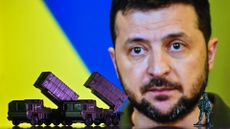 Will Iran attack hinder support for Ukraine?
Will Iran attack hinder support for Ukraine?Today's Big Question Pro-Kyiv allies cry 'hypocrisy' and 'double standards' even as the US readies new support package
By Elliott Goat, The Week UK Published
-
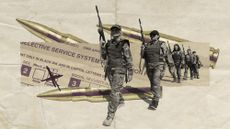 The issue of women and conscription
The issue of women and conscriptionUnder the radar Ukraine military adviser hints at widening draft to women, as other countries weigh defence options amid global insecurity
By Harriet Marsden, The Week UK Published
-
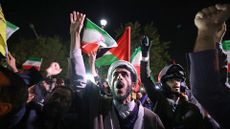 Will Iran's attack on Israel backfire?
Will Iran's attack on Israel backfire?Today's Big Question The unprecedented targeting of Israel could be a 'godsend' for Netanyahu as the limits of Tehran's military power are exposed
By Elliott Goat, The Week UK Published
-
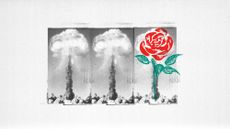 Labour and nuclear weapons: a turbulent ideological history
Labour and nuclear weapons: a turbulent ideological historyThe Explainer From the 1940s to Keir Starmer, the party leadership has zigzagged in and out of love with the bomb
By Chas Newkey-Burden, The Week UK Published
-
 Why is Ukraine backing far-right militias in Russia?
Why is Ukraine backing far-right militias in Russia?Today's Big Question The role of the fighters is a 'double-edged sword' for Kyiv, say commentators
By The Week UK Published
-
 Why is Islamic State targeting Russia?
Why is Islamic State targeting Russia?Today's Big Question Islamist terror group's attack on 'soft target' in Moscow was driven in part by 'opportunity and personnel'
By Elliott Goat, The Week UK Published
-
 Ukraine's unconventional approach to reconstruction
Ukraine's unconventional approach to reconstructionUnder the radar Digitally savvy nation uses popular app to file compensation claims, access funds and rebuild destroyed homes
By Harriet Marsden, The Week UK Published